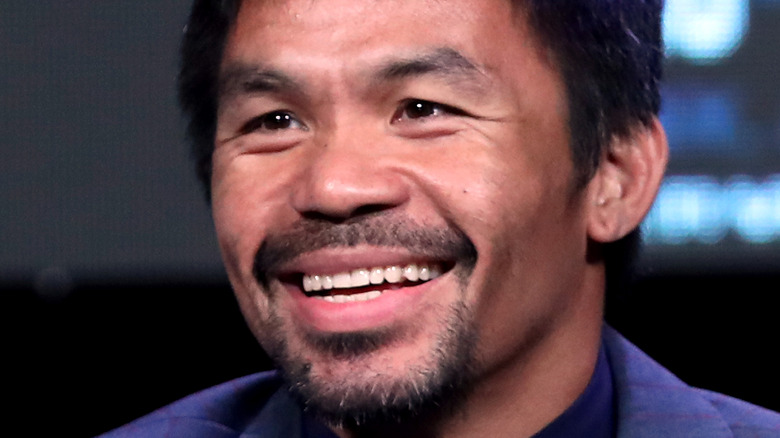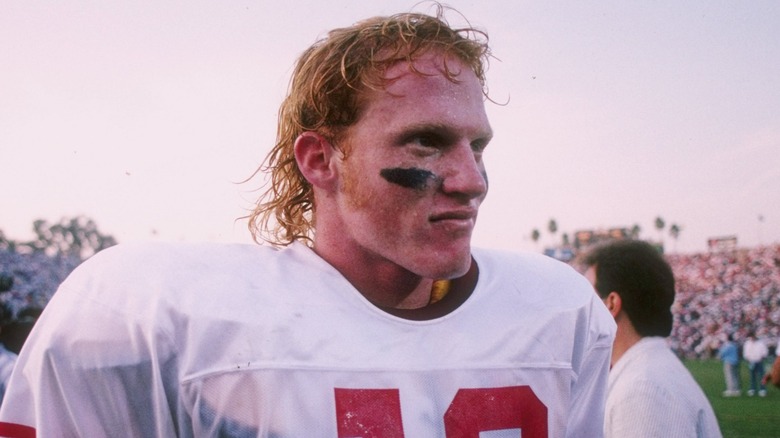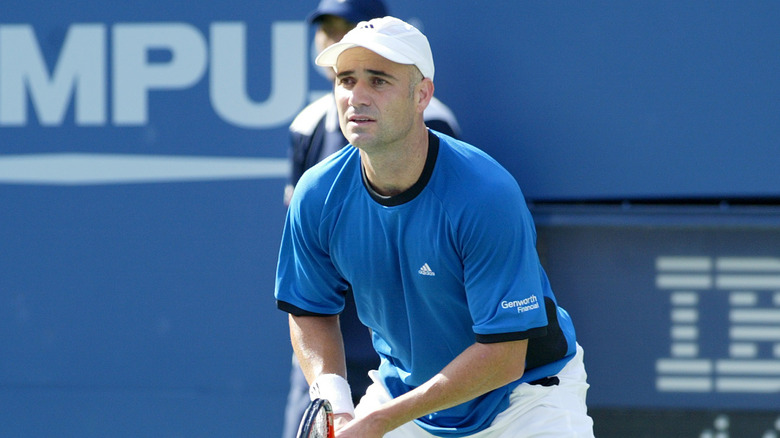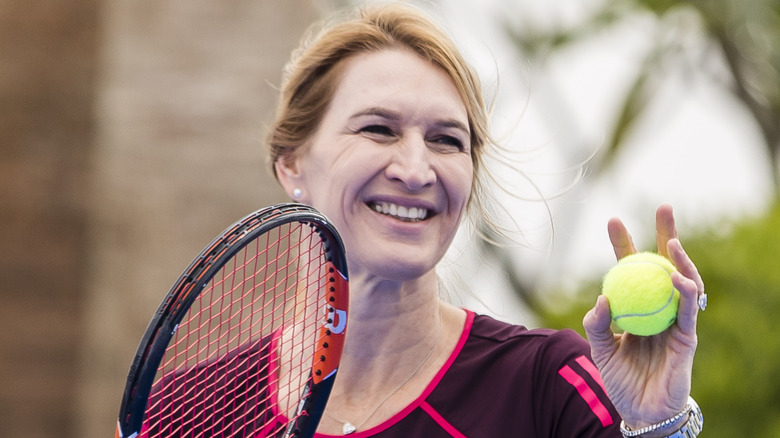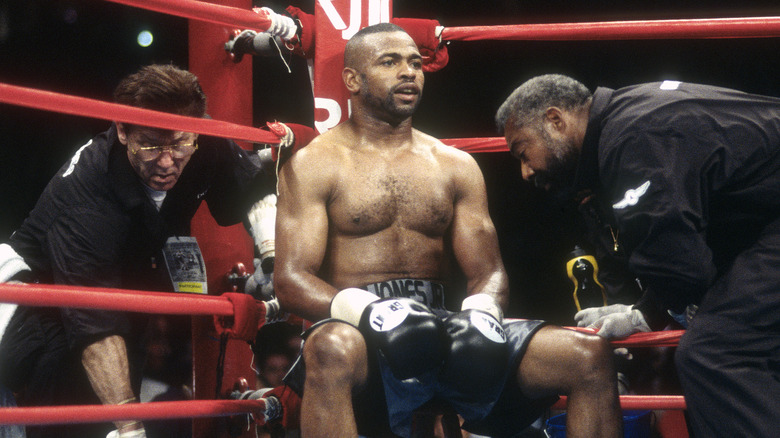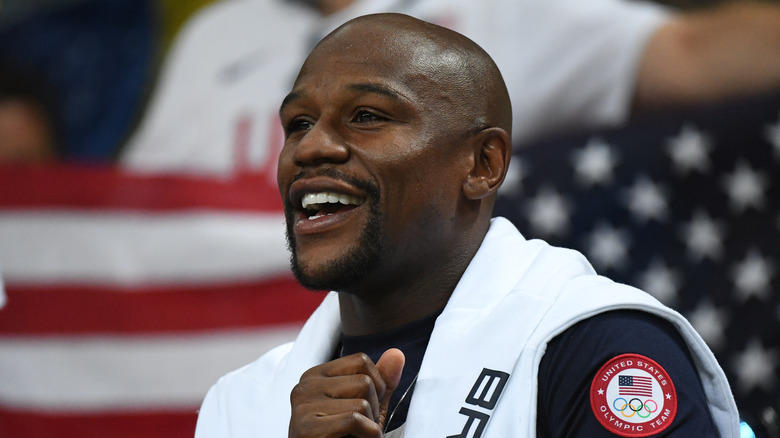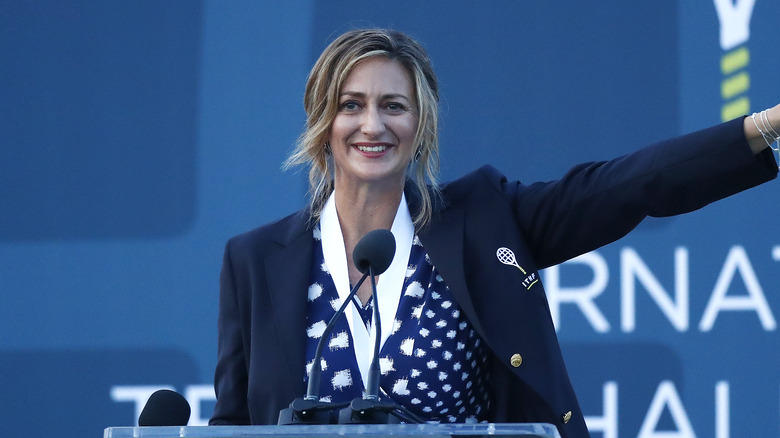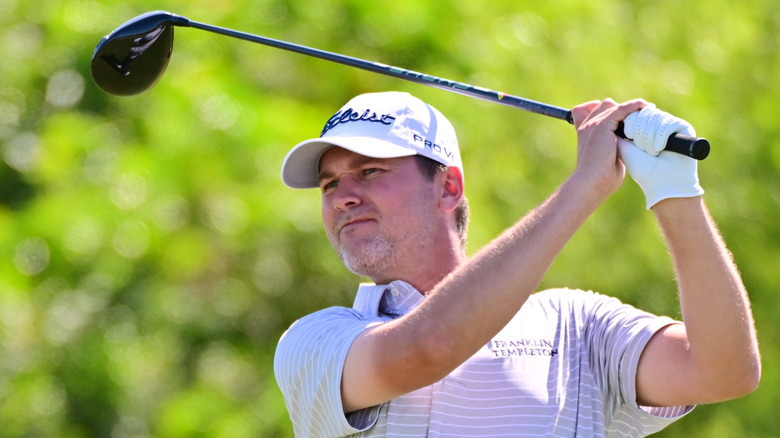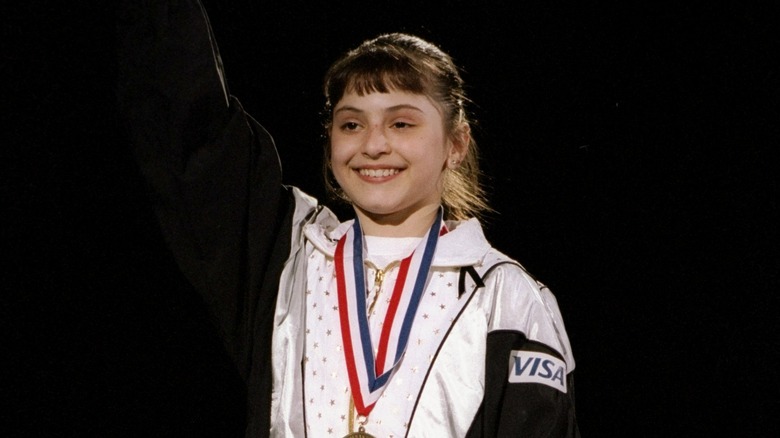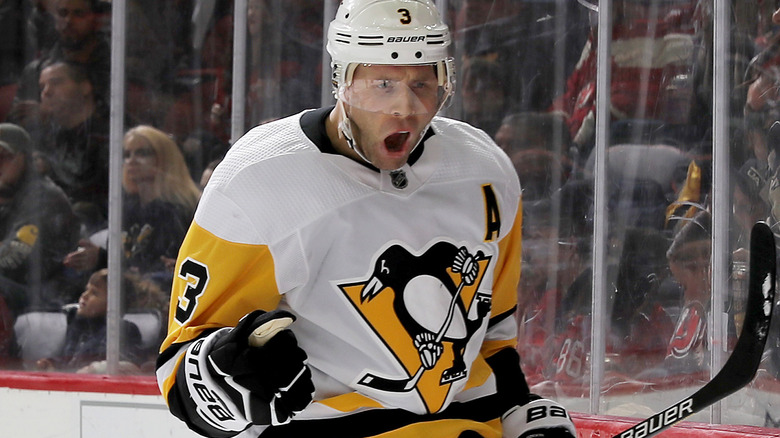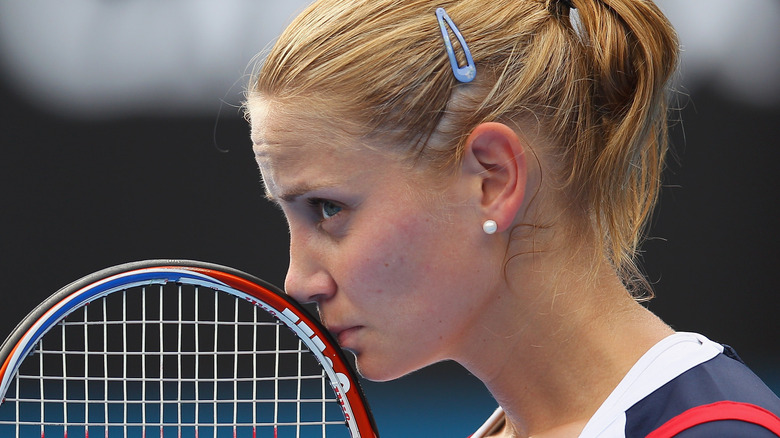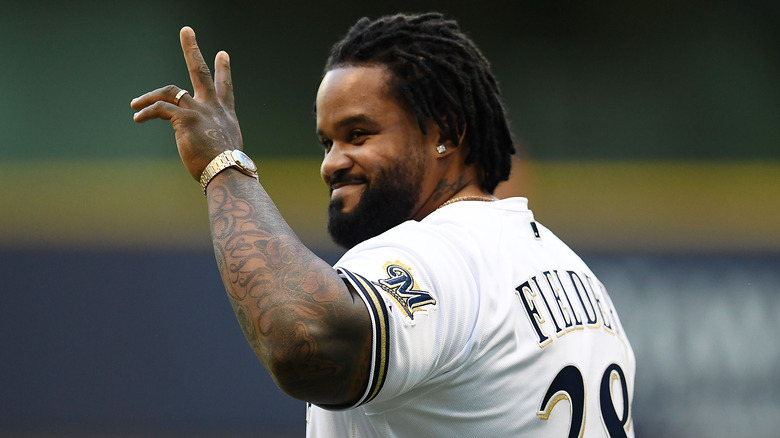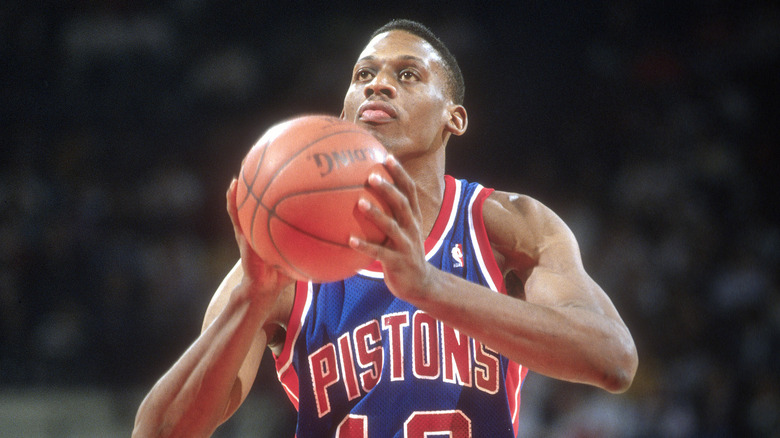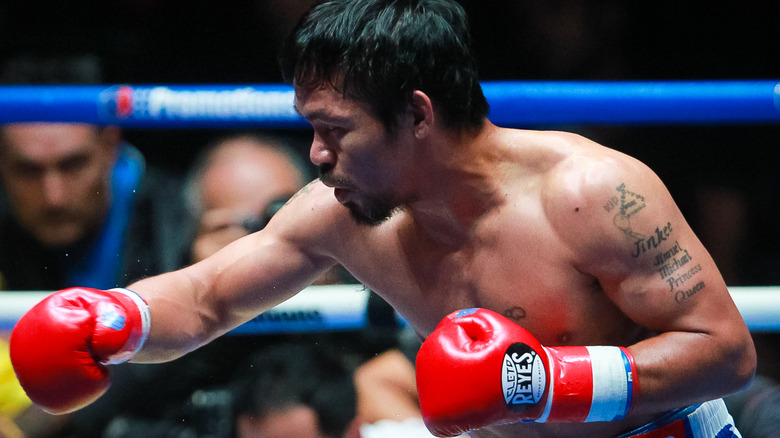Athletes Who Couldn't Stand Their Parents
One of the most critically acclaimed movies of 2021 was "King Richard," the biographical drama that followed the life of Richard Williams, the coach and father of tennis legends Venus and Serena Williams. While the movie was generally well-regarded, the consensus remains out on the man himself. Many saw Williams, who had no prior tennis experience, as overbearing and too protective (he would rarely allow other coaches and experts to work with his daughters), while others understood that he was just trying to protect his children from the sometimes-brutal world of professional sports.
Regardless of where you stand on Richard Williams, you'd be hard-pressed to say that he's the worst parent in sports history. In fact, compared to the parents of dozens of other professional athletes, Williams looks positively angelic. Below, we've rounded up a list of 13 of the worst parents in professional sports.
From those who beat and stalked their own children to those who got a little too greedy and stole millions of dollars their progeny had earned, these parents are downright awful.
Todd Marinovich
Todd Marinovich was one of those rare athletes who was just as much of a household name during his high school career as he was during his professional one. The California-born quarterback was profiled in Sports Illustrated back in 1988, when he was deciding which college he'd play for. The magazine wrote about his talent, sure, but also focused on the intense training regimen his father had him on since he was an infant.
According to Esquire, Todd's father, Marv Marinovich, studied Eastern Bloc training methods and became one of the NFL's first strength and conditioning coaches. When his son was born in 1969, the football-obsessed patriarch had one goal — making Todd the best quarterback in football history. So he started early, teaching the baby to do pushups and stand on a balance beam before he could walk. As the younger Marinovich grew up, there was no sugar, no fast food, no cartoons, no normal trappings of childhood, just endless practice and appointments with a team of experts who could turn the youngster into the best of the best.
Todd's early years were so intense that Sports Illustrated dubbed him "America's first test-tube athlete." Marv even admitted to the outlet that he was a "tyrant." This insane pressure eventually drove a wedge between father and son and sent Todd down a path of drug and alcohol addiction. However, the two seem to have reconciled sometime between Todd's exit from professional sports in 2001 and Marv's death in 2020.
If you or anyone you know is struggling with addiction issues, help is available. Visit the Substance Abuse and Mental Health Services Administration website or contact SAMHSA's National Helpline at 1-800-662-HELP (4357).
Andre Agassi
If Todd Marinovich's career was relatively short-lived and unremarkable, Andre Agassi's was the exact opposite. Over the course of his decades-long career, the tennis legend won eight Grand Slam titles and an Olympic gold medal. Despite all his success, Andre wrote in his 2009 autobiography "Open" (via The Sydney Morning Herald) that he hated his sport "with a dark and secret passion." Why? His intense — and often abusive — father, Mike Agassi.
Mike was Andre's first coach, requiring his son to hit 2,500 balls a day as an elementary schooler and giving the youngster speed in an attempt to ensure he had enough energy to play for hours on end. The intense — but questionable — training paid off, and Andre left school as a high school freshman in order to turn pro. Over the course of the next 20 years, Andre became, arguably, the most recognizable face in tennis, despite his deep dislike of the sport. The situation led to an estrangement between the two Agassis, and Andre dropped his father as his coach, training instead under Nick Bollettieri.
Mike never apologized for his over-the-top antics, only admitting in an interview with an Italian-language newspaper — which was reprinted by Tennis World — that he was "a tyrant, hard and severe." Somehow, the father and son seemed to repair their troubled relationship and had fully reconciled before Mike's death in 2021.
Steffi Graf
A tennis legend in her own right, Andre Agassi's wife, Steffi Graf, had difficulties with her own father. Peter Graf was Steffi's coach and manager, and — like Mike Agassi and Marv Marinovich — began training his daughter to be the best before she was old enough to enroll in school. When she was three, Peter gave Steffi a sawed-off racket and began volleying balls to her over the back of the couch. Only after she hit 25 in a row would she be rewarded.
His coaching style got even more extreme over the following years and took an abusive turn. According to The New York Times, Peter would often slap Steffi if she missed a shot or didn't complete a move to his liking. At the time, his violent actions weren't generally known, and outwardly Steffi maintained that her dad was an excellent coach. Her record seemed to prove it — over the course of her 17-year career, she won 22 Grand Slam titles and became the only player to win four Grand Slam titles and an Olympic gold medal in a single year.
But everything changed in 1997, when Peter was convicted of evading taxes on his daughter's income, owing about $7.4 million. Angry and embarrassed, Steffi cut off contact with her father, dropped him as a manager, and quit tennis altogether just two years later. Eventually, she reconciled with Papa Merciless, as her father had been nicknamed, and they were in regular contact when Peter died in 2013.
Roy Jones Jr.
Roy Jones Jr. may be considered one of the best boxers of all time, but his legendary status didn't come easily. Born in Pensacola, Florida, Jones Jr. is the oldest of five kids and the family's only son, so his father, Roy Jones Sr., pinned all of his own unrealized athletic dreams on the youngster and began sparring with him when he was just five or six. According to Jones Jr., his father was relentless, completely unforgiving, and not afraid to get physical, even going so far as to hit his young son with a plastic pipe that left welts when he missed a jab.
Things were so intense that Jones Jr. admitted to Sports Illustrated that he'd considered killing himself just to get away from his dominating dad. "After a while, I didn't care about gettin' hurt or dyin'. I was in pain ... I was so scared of my father. ... Gettin' hurt or dyin' might have been better than the life I was livin'. ... Used to think of killin' myself," he said. For his part, Jones Sr. openly admitted to terrorizing his athletic son. He told The New York Times, "To be a kingpin takes being hard. I made [him] train under pressure. ... Any mistake, I was right there."
Eventually, it all got to be too much, and by 1992, the boxer had fired his father as his coach and manager. As far as we can tell, the two men never reconciled.
If you or anyone you know is having suicidal thoughts, please call the National Suicide Prevention Lifeline at 1-800-273-TALK (8255).
Floyd Mayweather
Arguably the most dominant boxer in the sport's history, Floyd Mayweather Jr. did not have an easy time of it growing up. According to stories told to the Los Angeles Times, Mayweather's mother was an unreliable drug addict, and his father was a volatile drug dealer who once used his infant son as a shield in a gunfight. Despite his antics, it was Floyd Mayweather Sr., a former professional boxer himself, who introduced his son to the sport and began training him daily while he was in elementary school.
Even with the aggressive and unrelenting approach he had toward his son's training, Mayweather Sr. was able to remain in his son's good graces until 2000, when Mayweather Jr. fired his dad as both his manager and trainer. According to the Bleacher Report, the dismissal was due to Mayweather Sr.'s impossible expectations of perfection and Mayweather Jr.'s desire to train with his more relaxed uncle, Roger Mayweather.
After that initial spat, the father and son had an on-again-off-again relationship that almost ended for good in 2011, when an argument between them nearly came to blows. The fight, which was captured by HBO cameras, saw Mayweather Jr. tossing his father out of his gym and accusing him of being jealous and washed up. By the time of Mayweather Jr.'s retirement in 2017, undefeated and a multi-millionaire, he had reconciled with his pops, but given their turbulent history, who knows how long the peace will last.
Mary Pierce
There seems to be something about tennis that turns parents into monsters. Take, for example, Mary Pierce's dad. In the early '90s, Pierce was considered one of the best tennis players in the world, and her dad, Jim Pierce, was her coach. But in 1993, at the age of 14, just four years after she turned professional, Mary fired her father and immediately obtained a restraining order against him.
The move didn't come as a total shock — Jim was known to be violent (he had punched two fans at a tournament and would yell encouragements at his daughter from the stands like "kill the b****!") — but fans were still stunned to find out just how much of a brute Jim was. At the time, Mary revealed to Sports Illustrated that her father often hit her, and had made her so scared for her life that she had "hesitated to break away." When she did eventually cut him out of her life, Mary hired bodyguards to be with her 24/7, a decision that proved expedient when he stalked her through Europe and tried to break into her hotel room in Italy.
In 2007, Mary retired from professional tennis. She converted to Christianity, moved to Mauritius, and, in an act that shocked everyone who had followed her career, reconciled with her father. She credited her newfound faith with her decision to forgive, telling ESPN, "One of the greatest miracles is for me to forgive my dad and to love him."
Sean O'Hair
While tennis has a wealth of overbearing parents to choose from, golf only has a couple, and Marc O'Hair was one of them. In 1999, Marc's 17-year-old son Sean, the #2 junior player in the country, turned professional. For most of his life, Sean had been coached and managed by his father. It wasn't an easy position for the young man to be in — Golf Digest described Marc's training plan as "an almost military regimentation" — and things got even stickier when Marc required Sean to sign a contract that entitled him to 10% of his son's earnings for life.
Marc's obsession over Sean's success and subsequent control over his life (he reportedly dictated the number of minutes Sean had to get ready in the morning), proved to be too much. In 2002, Sean broke down in tears on the course in the middle of a tournament. In a "60 Minutes II" segment that aired after the incident (via ESPN), Marc called his only son "pretty good labor," effectively reducing his love for his child to the amount of money he could bring in. It seems the brutal comment was the straw that broke the camel's back, and a few months later, Sean completely cut ties with his dad.
As of this writing, Marc and Sean still don't have a relationship. In 2005, Sean told Golf Digest he doesn't imagine they ever will, thanks to his dad's obsession and inability to listen to his wants, needs, and opinions.
Dominique Moceanu
Gymnastics is known for being a particularly brutal sport, with its exacting expectations and demonstrated history of abuse, but even by these standards, 1996 Olympic gold medalist Dominique Moceanu had a rough experience. The 14-year-old made history at the Atlanta Games when she became the youngest U.S. gymnast to ever win that top honor. According to an interview with NPR, however, she wasn't fully able to enjoy the moment, as she was worried that her domineering father would be upset she biffed both of her vault landings.
Apparently, her fears were far from unfounded. Her father, she told NPR, had a history of being abusive, getting physical with her when he felt she wasn't training hard enough or had put on weight. He would reportedly even hit her in front of other people, including her coaches, the Karolyis, not caring who saw. Two years after the Olympic Games, Moceanu filed for emancipation. Shortly after that, she sued her parents for mismanaging her earnings (they had built a $4 million gym with her money), and then filed for a restraining order when they, angered by her bid for independence, began following her and threatening her.
Things undoubtedly got even more complicated between the trio when, in the early '00s, Moceanu discovered she had a younger sister her parents had never told her about. Her father died in 2008, and while the two were in communication, there's no official word on whether or not they had fully reconciled.
Jack Johnson III
While hockey may not be quite as mainstream as, say, football or baseball, there are still ample opportunities to earn a good amount of money. So when Jack Johnson III realized he had a talent for the game, he set his sights on the NHL. His parents supported his goals in a fairly healthy manner, which is likely why Johnson III was quick to trust them and believe they had his best interests at heart. Unfortunately, he couldn't have been more wrong.
At his parents' urging, Johnson III fired his first two managers — an odd move for someone as early in their career as he was. Now on his own, he turned over complete control of his finances to his parents and signed over his power of attorney to his mom. Tina and Jack Johnson II were quick to take advantage of their newfound position, blowing through their son's $30 million contract earnings and taking out a number of predatory loans in his name. They spent the money on everything from home improvement projects to sportscars to diamond rings and luxury vacations.
In 2014, Johnson III finally discovered what his parents had done and filed for bankruptcy. After cutting them off, Johnson III sold the house they were living in (that he'd paid for) in an attempt to pay down his debts. While it doesn't seem that Johnson III is fully estranged from his greedy parents, we have to imagine that their holiday dinners are pretty awkward.
Jelena Dokic
Following in the footsteps of Steffi Graf and Mary Pierce, Jelena Dokic became a professional tennis player when she was just a teenager. The prodigy quickly established a name for herself, beating much higher-ranked players like Martina Hingis and Pierce in the lead-up to her first Wimbledon tournament in 1999. Unfortunately, just like her heroes, Dokic was also suffering abuse at the hands of her father and coach, Damir Dokic.
In 2017, Jelena published her autobiography, "Unbreakable," which detailed the terrors she endured. She wrote that the abuse began when she was six, when her father slapped her for the first time after a disappointing performance on the court. The beatings continued until Jelena was in her 20s, and involved everything from being hit and kicked to being spat on and called derogatory terms. At one point, ESPN reported, her father beat her so hard after a loss that Jelena was knocked unconscious.
In 2002, Jelena finally got up the courage to break free from her father and left their shared home in the middle of the night with just her tennis racket and suitcase. In the years since, she's been critical of the tennis world, which did little to help her, despite being aware of her father's temper and volatility (he'd been kicked out of a number of tournaments and nicknamed the "tennis dad from hell"). Unsurprisingly, the two have no relationship to this day, and Jelena says she's given up trying to reconcile with her father.
If you or someone you know may be the victim of child abuse, please contact the Childhelp National Child Abuse Hotline at 1-800-4-A-Child (1-800-422-4453) or contact their live chat services.
Prince Fielder
For a little bit over a decade, between 2005 and 2016, Prince Fielder was one of the biggest names in professional baseball. The first baseman followed in his father, Cecil Fielder's, footsteps when he joined the MLB, and, at the time, it seemed the shared experience would only bring the two already close men even closer. As it turns out, that couldn't have been farther from the truth.
Despite having a close relationship for much of Prince's early life, things between the two Fielders began to unravel in 2004. That year, Cecil and Stacey Fielder, Prince's parents, began their divorce proceedings. In the process, it was revealed that the family was struggling financially and had a number of creditors chasing them down for large sums of money. The in-court fighting over who was at fault for the family's predicament got ugly, and Prince took his mother's side, accusing his dad of a gambling addiction and distancing himself from the man who taught him to be a power hitter. Things took an even uglier turn when Prince accused Cecil of taking $200,000 from his signing bonus without permission.
The pair's relationship was so strained that Prince once told the Detroit News, via CBS, that his father was dead to him. It took a long time for the two men to work things out, but eventually, they did. In 2015, when Prince retired, he was on speaking terms with his dad once again.
Dennis Rodman
For 17 years, Dennis Rodman was one of the most dominant power forwards in the NBA. An incredible defensive player with a knack for grabbing rebounds, he helped lead his various teams to five NBA championships. But despite his incredible on-the-court talent, Dennis was perhaps even more well-known for his off-the-court antics. There were the dozens of piercings, tattoos, and wild hair colors, his relationships with Madonna and Carmen Electra, his eccentric outfits (he once wore a wedding dress to a promotional event), and his close relationship with North Korean dictator Kim Jong-un.
Many folks attribute his wild behavior to his troubled childhood. Dennis was raised by a single mom in an impoverished neighborhood in Dallas after his father left when he was just three. Dennis and his father, the aptly named Philander Rodman, essentially had no relationship after that. Philander was too busy building other families — he had an additional 29 children by 16 women — to worry about checking in on his young son. For 42 years, Dennis had zero contact with his father, until they briefly (ESPN reported their meeting was only about 3 minutes long) reconnected at an exhibition game in the Philippines in 2012.
Dennis' dislike for his father — whom he believes abandoned him without a second thought — is well known. In his autobiography, "Bad As I Wanna Be," (via Jet) Rodman wrote, "I just look at it like this: Some man brought me into this world. That doesn't mean I have a father."
Manny Pacquiao
Manny Pacquiao has had an incredibly successful career. The only boxer to win world championship titles in four decades, Pacquiao has won 39 bouts by knockout and has only ever lost eight matches as a professional. His incredible stats have led him to be widely regarded as one of the best small boxers of all time. But all of his success may not have happened if he hadn't had such a horrible father.
Pacquiao grew up dirt poor in the Philippines with two parents who weren't all that concerned with his well-being. Craving affection, the youngster adopted a stray dog that would become his constant, loving companion. According to the prizefighter, his father came home late one night, drunk as a skunk, got angry with his juvenile son, and then — to really drive his displeasure with Pacquiao home — killed and ate his pet. The next day, Pacquiao left home, running away to Manila, where he'd discover his love of boxing.
In his autobiography, via The Washington Post, Pacquiao wrote of the incident, "He took the puppy I found and killed it. To a young boy, that was unforgivable — it was stealing something that I loved, which is far more terrible than stealing money." His father's vile actions (which he denies ever happened) drove a wedge between the pair, and for years Pacquiao had nothing to do with his dad. Eventually, the men reconciled, and Rosalio Pacquiao was even spotted ringside at a number of the boxer's later fights.

